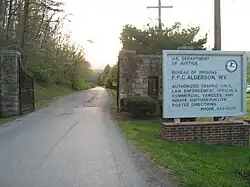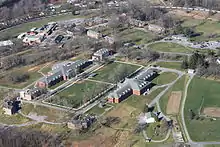 | |
| Location | Monroe and Summers Counties, West Virginia |
|---|---|
| Status | Operational |
| Security class | Minimum-security |
| Population | 667[1] |
| Opened | 1928 |
| Managed by | Federal Bureau of Prisons |
| Warden | D. Wilson |


The Federal Prison Camp, Alderson (FPC Alderson) is a minimum-security United States federal prison for female inmates in West Virginia. It is operated by the Federal Bureau of Prisons, a division of the United States Department of Justice.
FPC Alderson is in two West Virginia counties, near the town of Alderson. A portion of the prison is in unincorporated Monroe County, while the other portion of the prison,[2] including the dormitories, is in unincorporated Summers County.[3][4][5] The majority of the prison is in Summers County.[6] Four other area towns, Hinton, Lewisburg, Ronceverte, and White Sulphur Springs, are within commuting distance of FPC Alderson.[7]
History

In the 1920s, there was a shortage of federal prison space for female inmates.[8] Women offenders either were given alternative punishments or were housed alone within all-male institutions. Prison staff and fellow inmates sexually exploited girls and women who were incarcerated in these facilities.[8]
Mabel Walker Willebrandt, the Assistant U.S. Attorney General, first encouraged establishment of a facility for women.[9] FPC Alderson, which opened on April 30, 1927, as the Federal Industrial Institute for Women,[10] was the first federal women's prison in the United States.[11] It was opened during a reform movement in the 1920s to help reform female offenders.[12]
The first warden, Mary B. Harris, was chosen by Mabel Willebrandt.[9] Despite later bureau mythology that Alderson opened its doors with moonshining women from the hills of West Virginia, 174 women had been sent to the facility in the first year of operation before its formal November 14, 1928, opening.[13] The West Virginia location was chosen as it was remote enough from major population centers that potential escapes would be less likely while it had sufficient proximity to the American capital.[14]
Serving as a model for prison reform at the time, it was styled after a boarding school offering education with no armed guards.[15] The facility followed a reformatory model with no fenced grounds.[8] The prison consisted of primarily work-oriented facilities designed for minor federal offenders. It originally consisted of fourteen cottages built in a horseshoe pattern on two-tiered slopes.[16] The offenders segregated by race in the cottages and each building contained a kitchen and rooms for about thirty women.[16] The vast majority of the women were imprisoned for drug and alcohol charges imposed during the Prohibition era.[17]
Facility

FPC Alderson is a 159-acre (64 ha) facility and is the largest employer in the Alderson, West Virginia area.[18] The prison is about a five-hour driving distance from Washington, D.C.[14]
While there is no barbed wire on the fence surrounding the camp, the prisoners have schedules and each one must work. Inmates get holidays off except those who work in the powerhouse and kitchen.[19] From its beginning, Alderson's staff members have maintained a focus on vocational training and personal growth experiences, with craft-shop activities an integral part of vocational training.[20] Free time is spent walking around the sidewalk that is set between the two dorms as this is within bounds for the inmates. Since 2004 inmates are no longer free to roam the entire campus and are restricted in areas of the prison. They also play recreational activities such as volleyball.
Most of the inmates at FPC Alderson have been convicted of non-violent or white-collar crime. Many are in the drug program and have come from other prisons to attend the program at Alderson. They sleep in bunk beds in two large dormitories. The dormitories each hold over 500 inmates. Each inmate sleeps in a 5-by-9-foot (1.5 m × 2.7 m) cinder-block cubicle.
The prison was nicknamed "Camp Cupcake" by members of the news media when Martha Stewart was sentenced to a five-month term there[21] and was referred to as "Yale" by Stewart herself.[22] Local residents have also referred to it as "the college campus."[21] By 2004, according to Alexandra Marks of The Independent, the operating model for Alderson followed "a punitive rather than a rehabilitative model".[12]
John Benish, the former co-manager of the Alderson Hospitality House, a hospitality establishment where families of Alderson inmates stay, said that FPC Alderson is "built like a college campus. There is lot of property, a lot of greenery and there is no barbed wire around." The Alderson facility includes two dormitories with 500 inmates each. Inmates live in two-person cubicles instead of traditional barred prison cells.[23]
As of 2004, most prisoners at Alderson were convicted of recreational drug-related offenses. Esther Heffernan, a sociology professor at Edgewood College, said that throughout history the inmates included "relatives of famous mobsters and grandmotherly women who embezzled money from banks. You've had a real mixture." Hefferman added that in Alderson, which was a "not undesirable" place to be confined, the isolation from urban life could be stressful for inmates. She said that the inmates, "Coming from the streets of New York and D.C.," were awakened at night by crickets and frogs.[24] Prisoners are not permitted to patronize Alderson-area businesses.[25]
The facility allows weekend visits, but special hours are available for holidays.[19] In prior years the families of inmates were allowed past visiting rooms only on Thanksgiving Day when they could also share in a holiday feast for $1.75.[19]
FPC Alderson was one of six federal and state prisons participating in the Paws4prisons service dog training program.[26] This program allowed inmates the opportunity to interact and work with dogs.[27] This included an academic curriculum where inmates first learn how to train "shelter-rescue dogs" and then progress to developing highly trained assistance dogs.[28]
Notable inmates (current and former)
- Inmates released from custody prior to 1982 are not listed on the Federal Bureau of Prisons website.
Violent criminals
| Inmate name | Register number | Status | Details |
|---|---|---|---|
| Lolita Lebrón | 22167-069 | Sentence commuted by President Jimmy Carter in 1979; served 25 years. | Member of a group of Puerto Rican nationalists who opened fire inside the US House of Representatives in 1954, wounding five Congressmen; served additional prison time in 2001 for trespassing on military property for protesting the US Navy presence on the Puerto Rican island of Vieques.[29][30] |
| Margaret Waley | Unlisted[lower-alpha 1] | Released from custody in 1948 after serving 14 years. | Convicted in 1935 of kidnapping and conspiracy for her role as an accomplice in the kidnapping of George Weyerhaeuser.[31] |
| Kathryn Kelly | Unlisted[lower-alpha 1] | Released from custody in 1958 after serving 25 years. | Wife of notorious bank robber and murderer George Kelly Barnes, better known as "Machine Gun Kelly;" convicted in 1933 of being her husband's accomplice in the kidnapping of businessman and oil tycoon Charles F. Urschel.[32] |
| Lynette Fromme | 06075-180 | Spent the majority of her sentence at FPC Alderson; released in 2009 after serving 34 years. | Follower of cult leader and serial killer Charles Manson; attempted to assassinate U.S. President Gerald Ford on September 5, 1975; known by the nickname "Squeaky."[33][34] |
| Sara Jane Moore | 04851-180 | imprisoned 1975–78, in 1979 she escaped and was recaptured hours later;[35] released in 2007, after serving 32 years.[36] | Attempted to assassinate U.S. President Gerald Ford on September 22, 1975. |
Espionage, Smith Act and "Supporting the Enemy in Wartime" prisoners
| Inmate name | Register number | Status | Details |
|---|---|---|---|
| Velvalee Dickinson | Unlisted[lower-alpha 1] | imprisoned 1944–1951[37] | American convicted of espionage against the United States on behalf of Japan. |
| Iva Toguri D'Aquino | Unlisted[lower-alpha 1] | Was Held in FPC, Alderson[38] | American citizen who participated in English-language propaganda broadcast transmitted by Radio Tokyo to Allied soldiers in the South Pacific during World War II; known as "Tokyo Rose." |
| Mildred Gillars | Unlisted[lower-alpha 1] | imprisoned 1950–56[39][40] | American who supplied propaganda broadcasts for Nazi Germany; known as "Axis Sally." |
| Elizabeth Gurley Flynn | Unlisted[lower-alpha 1] | imprisoned 1955–57[41] | American leftist leader and co-founder of American Civil Liberties Union (ACLU), a Smith Act prisoner |
| Claudia Jones | Unlisted[lower-alpha 1] | imprisoned 1955–57[42] | Trinidadian-born child-immigrant journalist and National Executive member of the Communist Party of the United States, a Smith Act prisoner. After release, deported to the United Kingdom, founded the Notting Hill Carnival |
Corrupt public officials
| Inmate name | Register number | Status | Details |
|---|---|---|---|
| Monica Conyers | 43693-039 | Released from custody on May 16, 2013 after serving 3 years. | Detroit City Council member from 2005 to 2009 and wife of former-Congressman John Conyers; pleaded guilty to bribery in 2009 for accepting $60,000 from a waste management company in return for her helping the company win a $1.2 billion contract with the city.[43][44] |
| Meg Scott Phipps | 23786-056 | Released from custody in 2007 after serving 3 years. | North Carolina Agriculture Commissioner from 2001 to 2003; pleaded guilty in 2003 to extortion, mail fraud, and conspiracy for accepting thousands of dollars in illegal cash payments, falsifying campaign finance reports, and extorting money from carnival operators with the promise of state contracts.[45][46] |
Financial criminals
| Inmate name | Register number | Status | Details |
|---|---|---|---|
| Martha Stewart | 55170-054 | Released from custody in 2005 after serving 5 months. | American business magnate, television host, author, and magazine publisher; convicted in 2004 of obstruction of justice and lying to federal prosecutors investigating insider trading.[47][48] |
| Esther Reed | 40024-424 | Released from custody in 2011 after serving 3 years. | Former US Secret Service Most-Wanted Fugitive; pleaded guilty to fraud and identity theft for falsely assuming several identities, including that of missing person Brooke Henson, in order to steal money and gain entrance to Ivy League universities; Reed was featured on the television program America's Most Wanted.[49][50] |
| Diane Hathaway | 48069-039 Archived 2013-10-04 at the Wayback Machine | Released from custody in 2014 after serving 366 days. | Former Michigan Supreme Court Justice convicted of mortgage fraud.[51] |
Others
| Inmate name | Register number | Status | Details |
|---|---|---|---|
| Billie Holiday | Unlisted[lower-alpha 1] | imprisoned 1947–48[52] | American jazz singer and songwriter arrested for possession of narcotics on May 19, 1947 and sentenced to serve a year and a day, but released for good behavior on March 16, 1948. |
- ↑ Inmates released from custody prior to 1982 are not listed on the Federal Bureau of Prisons website.
See also
References
- ↑ "FPC Alderson". Federal Bureau of Prisons.
- ↑ McClam, Erin (2004-09-30). "Stewart's bunk reserved at minimum-security camp". Associated Press. p. D-8.
[...]in Monroe and Summers counties.
- Clipping from Newspapers.com. - ↑ "Martha's Prison Thanksgiving". Highbeam (The Cincinnati Post). 24 November 2004. Archived from the original on 2 November 2012. Retrieved 17 July 2011.
Mullins said the prison dormitories are in Summers County
- ↑ "County population drop due partly to inmate switch". Bluefield Daily Telegraph. Associated Press. 2001-07-07. p. 6.
The prison is located on Glen Ray Road in Monroe County. But Mullins said the prison dormitories are in Summers County.
- Found on Newspaperarchive.com - ↑ "FPC Alderson Contact Information". Federal Bureau of Prisons. Archived from the original on 10 January 2011. Retrieved 2 October 2011.
- ↑ "2020 CENSUS - CENSUS BLOCK MAP (INDEX): Summers County, WV" (PDF). U.S. Census Bureau. p. 6 (PDF p. 7/18). Retrieved 2022-08-15.
Alderson Federal Prison Cp
- ↑ "FPC Alderson". Federal Bureau of Prison. Retrieved 17 July 2011.
- 1 2 3 Johnson, Paula C. (2004). Inner lives: voices of African American women in prison. New York University Press. p. 313. ISBN 978-0-8147-4255-6. Retrieved 17 July 2011.
- 1 2 Sicherman, Barbara; Green, Carol Hurd (1980). Notable American women: the modern period : a biographical dictionary. Vol. 4. Harvard University Press. p. 736. ISBN 9780674627338. Retrieved 17 July 2011.
- ↑ Friedman, Lawrence (September 9, 1994). Crime And Punishment In American History. Basic Books. p. 428. ISBN 9780465024469. Retrieved April 28, 2018.
- ↑ Keller, Julia (1 October 2004). "It's a gosh-darned good thing: Stewart heads to West Virginia". Chicago Tribune. Archived from the original on 7 November 2012. Retrieved 17 July 2011.
- 1 2 Marks, Alexandra (8 October 2004). "The prison that Martha Stewart will call home". The Christian Science Monitor. Retrieved 17 July 2011.
- ↑ Roberts, John Walter (1994). Escaping prison myths: selected topics in the history of federal corrections. American University Press. p. 51. ISBN 978-1-879383-27-2. Retrieved 17 July 2011.
- 1 2 Vargas, Theresa (2017-06-09). "Beyond 'Orange Is the New Black': The storied past of Alderson federal women's prison". The Washington Post. Retrieved 2017-08-04.
- ↑ Heinemann, Sue (1995). Timelines of American women's history. Penguin Group. p. 155. ISBN 978-0-399-51986-4. Retrieved 17 July 2011.
- 1 2 American Correctional Association (1993). Female offenders: meeting needs of a neglected population. American Correctional Association. p. 18. ISBN 978-0-929310-86-2. Retrieved 17 July 2011.
- ↑ "This-day-in-history – The first federal prison for women opens". history.com. Retrieved 17 July 2011.
- ↑ "Higgins, Marguerite (9 October 2004). "Welcome to Alderson; Stewart began her five months before dawn at W.Va. prison". Goliath (The Washington Times). Retrieved 17 July 2011.
- 1 2 3 Helderman, Rosalind S. (24 November 2004). "Domestic Diva to Spend Thanksgiving Inside – Turkey, Few Trimmings For Jailed Media Mogul". The Washington Post. Retrieved 17 July 2011.
- ↑ "FPC Alderson Inmate Handbook" (PDF). Federal Prison Camp Alderson. 10 November 2010. p. 2. Retrieved 17 July 2011.
- 1 2 Thompson, Anne (7 October 2004). "Ultimate planner set to lose control of her life: Martha Stewart won't mistake 'Camp Cupcake' for the Hamptons". NBC News. Retrieved 17 July 2011.
- ↑ de Vries, Lloyd (20 September 2005). "How Martha Coped At 'Yale'". CBS News. Retrieved 17 July 2011.
- ↑ Meier, Barry (30 September 2004). "Martha Stewart Assigned to Prison in West Virginia". The New York Times. Retrieved 17 July 2011.
- ↑ Crawford, Krysten (29 September 2004). "Martha going to 'Camp Cupcake'". CNN/Money. Retrieved 17 July 2011.
- ↑ Keller, Julia (1 October 2004). "It's a gosh-darned good thing: Stewart heads to West Virginia". Chicago Tribune. Archived from the original on 7 November 2012. Retrieved 17 July 2011.
They're forbidden to frequent Alderson businesses, so Simms has never trimmed a...
- ↑ Kyria (August 22, 2011). "Some of the DOGs' activities at Federal Prison Camp Alderson (WV)". paws4people foundation. Retrieved 23 October 2017.
- ↑ Asbury, Kyla (22 October 2013). "Inmate, afraid of dogs, loses lawsuit over broken leg". West Virginia Record. Retrieved 12 September 2019.
- ↑ "The paws4prisons Program". paws4people.org. Retrieved 12 September 2019.
- ↑ Martin, Douglas (3 August 2010). "Lolita Lebrón, Puerto Rican Nationalist, Dies at 90". The New York Times.
- ↑ Ruíz, Vicki; Korrol, Virginia Sánchez (2006). Latinas in the United States: a historical encyclopedia. Vol. 1. Indiana University Press. p. 381. ISBN 978-0-253-34681-0. Retrieved 17 July 2011.
- ↑ McClary, Daryl C. (2006-03-27). "the Free Online Encyclopedia of Washington State History". HistoryLink.org. Retrieved 2015-10-09.
- ↑ "Don't Call Us Molls: Kathryn Kelly". Dillingerswomen.com. Retrieved 2015-10-09.
- ↑ Craughwell, Thomas J. (2011). Busted: Mugshots and Arrest Records of the Famous and Infamous. Black Dog & Leventhal. p. 156. ISBN 978-1-57912-865-4. Retrieved 17 July 2011.
- ↑ "Manson Disciple "Squeaky" Fromme Set Free". CBS News. 2009-08-14. Retrieved 2015-10-09.
- ↑ "Sara Jane Moore Flees, Is Caught". Los Angeles Times. 6 February 1979. Retrieved 17 July 2011.
- ↑ "Would-be Ford assassin freed from prison on parole - CNN.com". www.cnn.com. Retrieved 2017-06-09.
- ↑ "Velvalee Dickinson, the "Doll Woman"". FBI. Archived from the original on 2 May 2013. Retrieved 17 July 2011.
- ↑ Weatherford, Doris (2009). American women during World War II: an encyclopedia. Taylor & Francis. p. 433. ISBN 978-0-415-99475-0. Retrieved 17 July 2011.
- ↑ Lucas, Richard (2010). Axis Sally: The American Voice of Nazi Germany. Casemate Publishers. pp. 223, 292. ISBN 978-1-935149-43-9. Retrieved 17 July 2011.
- ↑ "Obituaries: Mildred Gillars, 87, Axis Sally During War". The New York Times. 1 July 1988. Retrieved 17 July 2011.
- ↑ Flynn, Elizabeth Gurley (1963). The Alderson story: my life as a political prisoner. International Publishers.
- ↑ "Claudia Jones". Black History Month. Archived from the original on 19 October 2016. Retrieved 29 October 2011.
- ↑ "Monica Conyers, Wife of Judiciary Chairman Rep. John Conyers Pleads Guilty to Bribery – ABC News". Abcnews.go.com. 2009-06-26. Retrieved 2015-10-09.
- ↑ "Monica Conyers, Wife To John Conyers, Sentenced To 3 Years In Prison For Detroit Bribes". Huffington Post. May 10, 2010. Retrieved 2018-08-14.
- ↑ "Phipps To Spend Four Years In Prison For State Ag Department Scandal". WRAL.com. 2004-03-02. Retrieved 2015-10-09.
- ↑ "Meg Scott Phipps Released From Prison". digtriad.com. 2007-04-23. Archived from the original on 2013-01-21. Retrieved 2015-10-09.
- ↑ "Stewart convicted on all charges". CNN. 5 March 2004.
- ↑ "Martha Stewart Sentenced to 5 Months in Prison". The Washington Post. 16 July 2004.
- ↑ "United States Secret Service Fiscal Year 2008 Annual Report" (PDF). Archived from the original (PDF) on August 25, 2012.
- ↑ "America's Most Wanted: America Fights Back : Esther Reed Capture". IMDb.com. Retrieved 2015-10-09.
- ↑ Ross Jones (2013-01-30). "With Hathaway now a felon, Gov. Snyder mulls her replacement". WXYZ.com. Retrieved 2015-10-09.
- ↑ Alagna, Magdalena (2003). Billie Holiday. Rosen Publishing. pp. 60–70. ISBN 978-0-8239-3640-3. Retrieved 17 July 2011.
External links
 Media related to Federal Prison Camp, Alderson at Wikimedia Commons
Media related to Federal Prison Camp, Alderson at Wikimedia Commons- FPC Alderson – Federal Bureau of Prisons
- "FPC Alderson Inmate Handbook" (PDF). Federal Prison Camp Alderson. 10 November 2010. Archived (PDF) from the original on 2013-02-21. ()
- Hanrahan, Clare (2003). "Alderson: Reclaiming the Vision". SeniorWomen.com.
- Historic American Buildings Survey (HABS) No. WV-113, "Federal Reformatory for Women, State Route 3, South of Greenbriar River, Alderson vicinity, Summers, WV"
- HABS No. WV-113-A, "Federal Reformatory for Women, Administration Building"
- HABS No. WV-113-B, "Federal Reformatory for Women, School & Chapel"
- HABS No. WV-113-C, "Federal Reformatory for Women, Cottages"
- HABS No. WV-113-D, "Federal Reformatory for Women, Warden's House"
